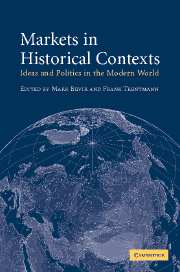Book contents
- Frontmatter
- Contents
- Acknowledgements
- List of contributors
- 1 Markets in historical contexts: ideas, practices and governance
- 2 Improving justice: communities of norms in the Great Transformation
- 3 The politics of political economy in France from Rousseau to Constant
- 4 Tories and markets: Britain 1800–1850
- 5 Guild theory and guild organization in France and Germany during the nineteenth century
- 6 Thinking green, nineteenth-century style: John Stuart Mill and John Ruskin
- 7 Tönnies on ‘community’ and ‘civil society’: clarifying some cross-currents in post-Marxian political thought
- 8 German historicism, progressive social thought, and the interventionist state in the United States since the 1880s
- 9 Civilizing markets: traditions of consumer politics in twentieth-century Britain, Japan and the United States
- 10 The ideologically embedded market: political legitimation and economic reform in India
- 11 The locational and institutional embeddedness of electronic markets: the case of the global capital markets
- Index
3 - The politics of political economy in France from Rousseau to Constant
Published online by Cambridge University Press: 22 July 2009
- Frontmatter
- Contents
- Acknowledgements
- List of contributors
- 1 Markets in historical contexts: ideas, practices and governance
- 2 Improving justice: communities of norms in the Great Transformation
- 3 The politics of political economy in France from Rousseau to Constant
- 4 Tories and markets: Britain 1800–1850
- 5 Guild theory and guild organization in France and Germany during the nineteenth century
- 6 Thinking green, nineteenth-century style: John Stuart Mill and John Ruskin
- 7 Tönnies on ‘community’ and ‘civil society’: clarifying some cross-currents in post-Marxian political thought
- 8 German historicism, progressive social thought, and the interventionist state in the United States since the 1880s
- 9 Civilizing markets: traditions of consumer politics in twentieth-century Britain, Japan and the United States
- 10 The ideologically embedded market: political legitimation and economic reform in India
- 11 The locational and institutional embeddedness of electronic markets: the case of the global capital markets
- Index
Summary
The limits of the received story
Until Smith's work, the study of politics, properly speaking the science of government, had been confounded with political economy, which shows how wealth is created, distributed and consumed. This confusion stems perhaps solely from the unfortunate title given to researches of this kind … [in consequence] the demand has been made that political economy concern itself with all of the laws that regulate the domestic life of the political family.
Jean-Baptiste Say's judgement can be seen to problematize the title of this essay: Say appeared to be turning his back on the politics of political economy. According to Say, political economy needed to be restricted to the empirically certain science of wealth; this, he said, was Adam Smith's achievement in the Wealth of Nations. Wealth was ‘independent of forms of government’. A state could be prosperous, regardless of who governed it, ‘if it is well administered’. Looking backwards from 1803, Say held Jean-Jacques Rousseau, along with François Quesnay's sect of ‘économistes’ or physiocrats, responsible for impeding the progress of political economy as a science. His rise to prominence during the Restoration did not alter this view. Despite numerous changes made to Say's Traité, it was repeated in the editions of 1814, 1817 and 1826. When he published what he believed to be his magnum opus in 1828–9, the Cours complet d'économie politique pratique, he included an essay on the historical progress of political economy.
- Type
- Chapter
- Information
- Markets in Historical ContextsIdeas and Politics in the Modern World, pp. 46 - 69Publisher: Cambridge University PressPrint publication year: 2004
- 3
- Cited by



